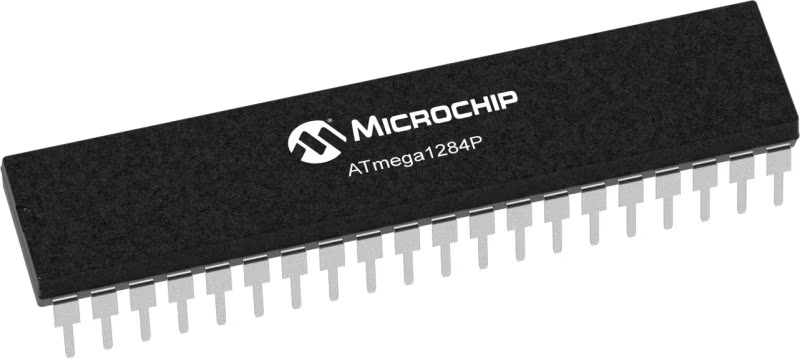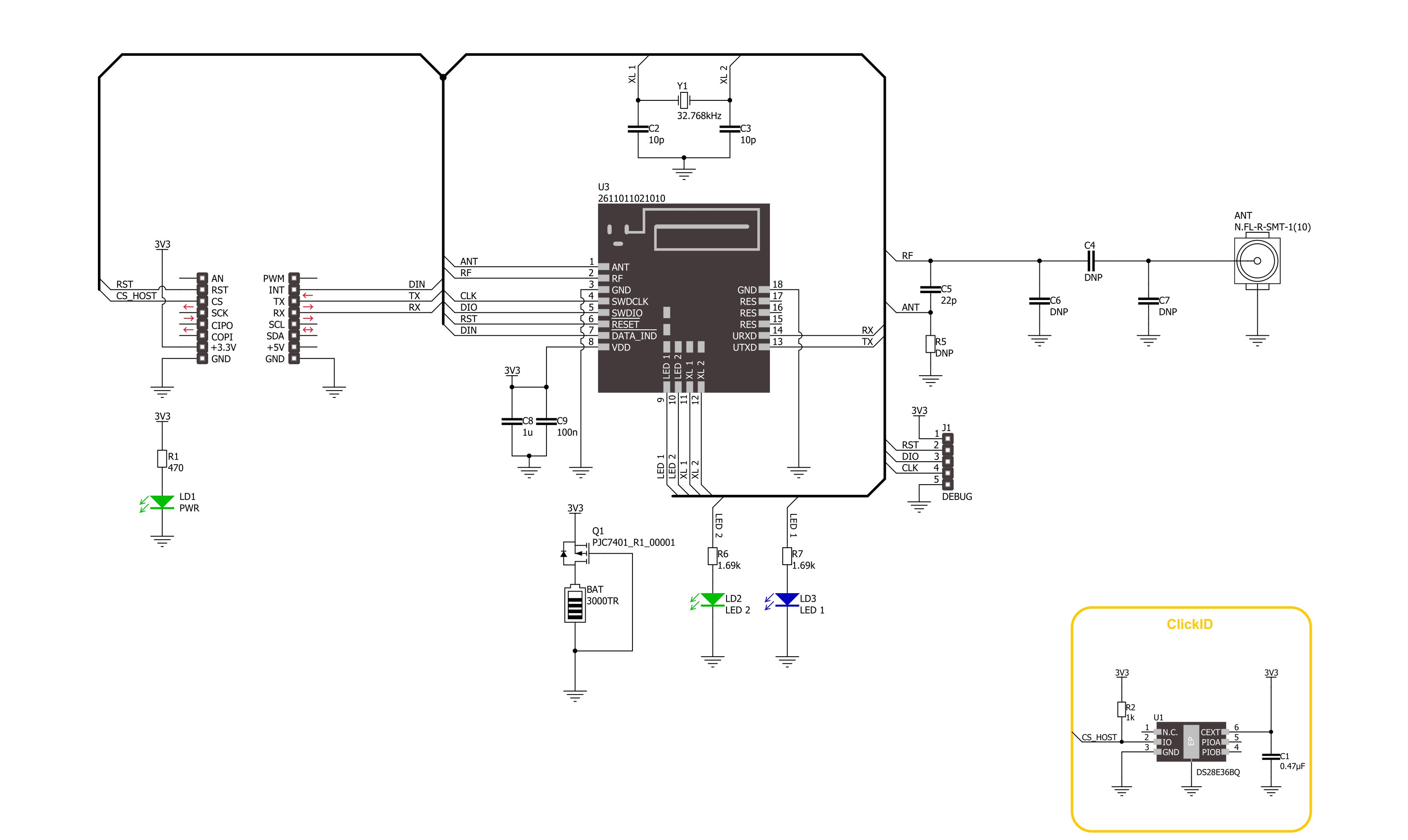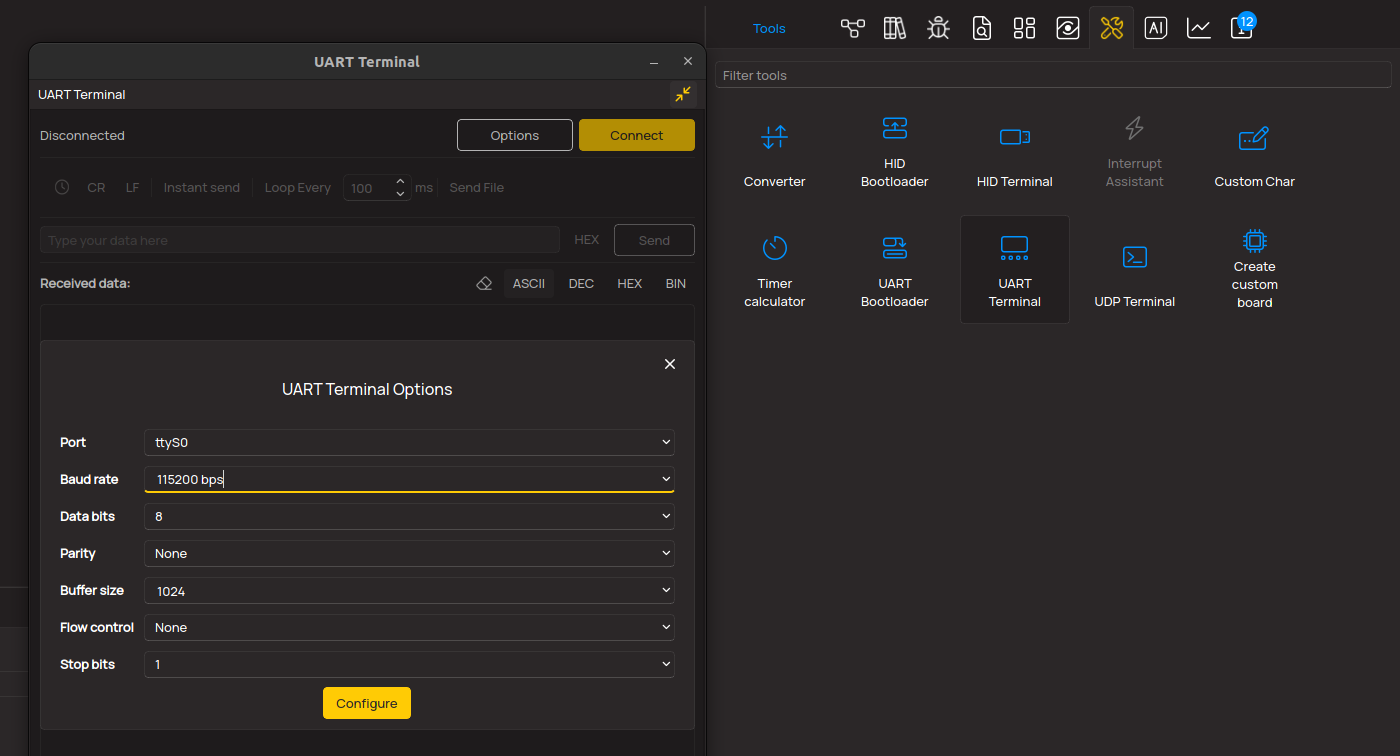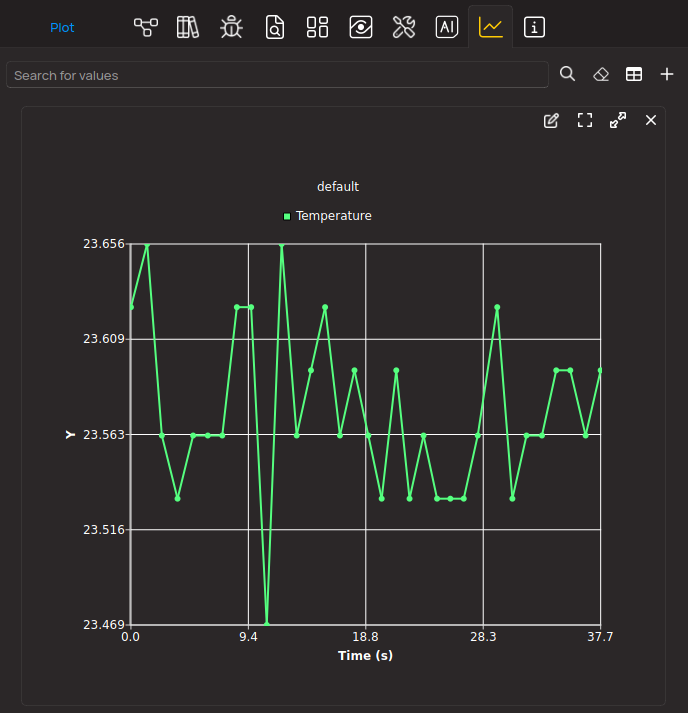您的网关可以创建坚固的、自愈的和节能的网状网络,适用于智能照明、资产追踪等应用!
A
A
硬件概览
它是如何工作的?
Wirepas Click 基于 Würth Elektronik 的 WIRL-PRO2 Thetis-I,这是一款带有 Wirepas Mesh 协议的无线电模块。该模块旨在集成到基于 Wirepas 的路由网络中,用于设备或节点之间的无线通信。该模块在全球可用的免许可 2.4 GHz 频段内安全可靠地传输数据,具有认证和加密机制。WIRL-PRO2 Thetis-I 模块具有与 nano-SIM 卡相当的小尺寸(8 mm x 12 mm),包括板载 PCB 天线,使其非常适合小型设计。该模块工作在 2402 到 2480MHz 的频率范围内,数据速率高达 1Mbps。它基于 Nordic
Semiconductor 的 32 位 ARM Cortex-M4 微控制器 nRF52840,配有 1MB 闪存和 256KB RAM。它具有印刷天线和智能天线配置(2 合 1 模块),允许高达 +6dBm 的发射功率和 -92dBm 的灵敏度。通过连接到板载 N.FL 连接器的外部天线,连接性能可以更好。由于其非常低的功耗,Wirepas Click 可以作为信标使用。为此,它配备了一个备用电池。此外,还有两个用户可配置的指示 LED,LED1 和 LED2(蓝色和绿色)。此外,Wirepas Click 还配备了一个未焊接的调试头,用于与 Wirepas 微控制器进行直接
通信。Wirepas Click 使用标准的 2 线 UART 接口与主 MCU 通信,支持 115200bps 的比特率。您可以通过 RST 引脚重置设备。DIN 引脚用于观察数据流,当处于低电平逻辑状态时,它是指向主 MCU 的数据指示。此 Click board™ 只能在 3.3V 逻辑电压水平下运行。使用具有不同逻辑电平的 MCU 之前,板必须进行适当的逻辑电压水平转换。此外,这款 Click board™ 配备了包含易于使用的功能和示例代码的库,可用于进一步开发。
功能概述
开发板
EasyAVR v7 是第七代AVR开发板,专为快速开发嵌入式应用的需求而设计。它支持广泛的16位AVR微控制器,来自Microchip,并具有一系列独特功能,如强大的板载mikroProg程序员和通过USB的在线电路调试器。开发板布局合理,设计周到,使得最终用户可以在一个地方找到所有必要的元素,如开关、按钮、指示灯、连接器等。EasyAVR v7 通过每个端口的四种不同连接器,比以往更高效地连接附件板、传感器和自定义电子产品。EasyAVR v7 开发板的每个部分
都包含了使同一板块运行最高效的必要组件。一个集成的mikroProg,一个快速的USB 2.0程序员,带有mikroICD硬件在线电路调试器,提供许多有价值的编 程/调试选项和与Mikroe软件环境的无缝集成。除此之外,它还包括一个干净且调节过的开发板电源供应模块。它可以使用广泛的外部电源,包括外部12V电源供应,7-12V交流或9-15V直流通过DC连接器/螺丝端子,以及通过USB Type-B(USB-B)连接器的电源。通信选项如USB-UART和RS-232也包括在内,与
广受好评的mikroBUS™标准、三种显示选项(7段、图形和基于字符的LCD)和几种不同的DIP插座一起,覆盖了广泛的16位AVR MCU。EasyAVR v7 是Mikroe快速开发生态系统的一个组成部分。它由Mikroe软件工具原生支持,得益于大量不同的Click板™(超过一千块板),其数量每天都在增长,它涵盖了原型制作和开发的许多方面。
微控制器概述
MCU卡片 / MCU

建筑
AVR
MCU 内存 (KB)
128
硅供应商
Microchip
引脚数
40
RAM (字节)
16384
使用的MCU引脚
mikroBUS™映射器
“仔细看看!”
Click board™ 原理图

一步一步来
项目组装
实时跟踪您的结果
应用程序输出
1. 应用程序输出 - 在调试模式下,“应用程序输出”窗口支持实时数据监控,直接提供执行结果的可视化。请按照提供的教程正确配置环境,以确保数据正确显示。

2. UART 终端 - 使用UART Terminal通过USB to UART converter监视数据传输,实现Click board™与开发系统之间的直接通信。请根据项目需求配置波特率和其他串行设置,以确保正常运行。有关分步设置说明,请参考提供的教程。

3. Plot 输出 - Plot功能提供了一种强大的方式来可视化实时传感器数据,使趋势分析、调试和多个数据点的对比变得更加直观。要正确设置,请按照提供的教程,其中包含使用Plot功能显示Click board™读数的分步示例。在代码中使用Plot功能时,请使用以下函数:plot(insert_graph_name, variable_name);。这是一个通用格式,用户需要将“insert_graph_name”替换为实际图表名称,并将“variable_name”替换为要显示的参数。

软件支持
库描述
该库包含 Wirepas Click 驱动程序的 API。
关键功能:
wirepas_send_command- Wirepas 发送命令功能。wirepas_write_csap_attribute- Wirepas 写入 CSAP 属性功能。wirepas_send_data- Wirepas 发送数据功能。
开源
代码示例
完整的应用程序代码和一个现成的项目可以通过NECTO Studio包管理器直接安装到NECTO Studio。 应用程序代码也可以在MIKROE的GitHub账户中找到。
/*!
* @file main.c
* @brief Wirepas Click Example.
*
* # Description
* This example demonstrates the use of Wirepas click board by processing
* the incoming data and displaying them on the USB UART in sink mode, and sending data to
* the sinks in router mode.
*
* The demo application is composed of two sections :
*
* ## Application Init
* Initializes the driver and performs the click default configuration, setting device mode, node,
* net and channel addresses, and starting stack.
*
* ## Application Task
* Router mode - Sending data to the sinks at the same network.
* Sink mode - Reads and processes all incoming data and displays them on the USB UART.
*
* ## Additional Function
* - err_t wirepas_get_resp ( wirepas_t *ctx )
*
* @note
* For the best experience use two clicks in sink mode and one in router.
*
* @author Stefan Ilic
*
*/
#include "board.h"
#include "log.h"
#include "wirepas.h"
#define PROCESS_BUFFER_SIZE 200
#define TX_DATA "Wirepas Click"
#define MULTI_SINK_MODE // Comment out this macro to place device into single sink mode.
/**
* @brief Wirepas node addresses.
* @details Specified setting for node addresses of Wirepas Click driver.
*/
#define ROUTER_NODE_ADDRESS 0x01
#define SINK_1_NODE_ADDRESS 0x02
#define SINK_2_NODE_ADDRESS 0x03
#define NET_ADDRESS 0x01
#define CHANNEL_ADDRESS 0x01
#define NODE_ADDRESS ROUTER_NODE_ADDRESS /* Change the value of this macro to change
node address, each node should have a unique address */
static wirepas_t wirepas;
static log_t logger;
uint8_t frame_id = 0;
wirepas_sink_data sink_1;
wirepas_sink_data sink_2;
/**
* @brief Wirepas get response function.
* @details This function is used to get response from the device.
* @param[in] ctx : Click context object.
* See #wirepas_t object definition for detailed explanation.
* @return @li @c >=0 - Success,
* @li @c <0 - Error.
* See #err_t definition for detailed explanation.
* @note None.
*/
err_t wirepas_get_resp ( wirepas_t *ctx );
void application_init ( void )
{
log_cfg_t log_cfg; /**< Logger config object. */
wirepas_cfg_t wirepas_cfg; /**< Click config object. */
/**
* Logger initialization.
* Default baud rate: 115200
* Default log level: LOG_LEVEL_DEBUG
* @note If USB_UART_RX and USB_UART_TX
* are defined as HAL_PIN_NC, you will
* need to define them manually for log to work.
* See @b LOG_MAP_USB_UART macro definition for detailed explanation.
*/
LOG_MAP_USB_UART( log_cfg );
log_init( &logger, &log_cfg );
log_info( &logger, " Application Init " );
// Click initialization.
wirepas_cfg_setup( &wirepas_cfg );
WIREPAS_MAP_MIKROBUS( wirepas_cfg, MIKROBUS_1 );
if ( UART_ERROR == wirepas_init( &wirepas, &wirepas_cfg ) )
{
log_error( &logger, " Communication init." );
for ( ; ; );
}
wirepas_default_cfg ( &wirepas );
uint8_t tmp_data[ 1 ] = { 0x00 };
Delay_ms( 1000 );
wirepas_poll_indication( &wirepas, frame_id, NULL, NULL );
frame_id++;
Delay_ms( 1000 );
wirepas_poll_indication( &wirepas, frame_id, NULL, NULL );
frame_id++;
Delay_ms( 1000 );
log_printf( &logger, " Wirepas stack stop request: \n" );
wirepas_send_command( &wirepas, WIREPAS_MSAP_STACK_STOP_REQUEST, frame_id, 0x00, tmp_data );
frame_id++;
wirepas_get_resp( &wirepas );
Delay_ms( 1000 );
log_printf( &logger, " Wirepas factory reset request: \n" );
wirepas_send_command( &wirepas, WIREPAS_CSAP_FACTORY_RESET_REQUEST, frame_id, strlen( WIREPAS_FACTORY_RESET_CODE ), WIREPAS_FACTORY_RESET_CODE );
frame_id++;
wirepas_get_resp( &wirepas );
Delay_ms( 1000 );
wirepas_poll_indication( &wirepas, frame_id, NULL, NULL );
frame_id++;
Delay_ms( 1000 );
wirepas_poll_indication( &wirepas, frame_id, NULL, NULL );
frame_id++;
Delay_ms( 1000 );
log_printf( &logger, " Set node address: \n" );
wirepas_set_node_address( &wirepas, frame_id, NODE_ADDRESS );
frame_id++;
wirepas_get_resp( &wirepas );
Delay_ms( 1000 );
log_printf( &logger, " Set net address: \n" );
wirepas_set_net_address( &wirepas, frame_id, NET_ADDRESS );
frame_id++;
wirepas_get_resp( &wirepas );
Delay_ms( 1000 );
log_printf( &logger, " Set channel address: \n" );
uint8_t channel_net = CHANNEL_ADDRESS;
wirepas_write_csap_attribute( &wirepas, frame_id, WIREPAS_CSAP_ATTRIBUTE_NETWORK_CHANNEL, 1, &channel_net );
frame_id++;
wirepas_get_resp( &wirepas );
Delay_ms( 1000 );
log_printf( &logger, " Set role: \n" );
uint8_t role;
#if ( ROUTER_NODE_ADDRESS == NODE_ADDRESS )
role = WIREPAS_ROUTER_NODE_MODE;
#else
role = WIREPAS_SINK_NODE_MODE;
#endif
wirepas_write_csap_attribute( &wirepas, frame_id, WIREPAS_CSAP_ATTRIBUTE_NODE_ROLE, 1, &role );
frame_id++;
wirepas_get_resp( &wirepas );
Delay_ms( 1000 );
log_printf( &logger, " Wirepas Stack start request: \n" );
tmp_data[ 0 ] = 0x01;
wirepas_send_command( &wirepas, WIREPAS_MSAP_STACK_START_REQUEST, frame_id, 0x01, tmp_data );
frame_id++;
wirepas_get_resp( &wirepas );
uint8_t data_buf[ WIREPAS_RX_DRV_BUFFER_SIZE ] = { 0 };
#if ( ROUTER_NODE_ADDRESS == NODE_ADDRESS )
Delay_ms( 1000 );
wirepas_poll_indication( &wirepas, frame_id, data_buf, NULL );
frame_id++;
sink_1.pduid = 0x00;
sink_1.source_endpoint = 0x01;
sink_1.destination_addr = SINK_1_NODE_ADDRESS;
sink_1.destination_endpoint = 0x01;
#if defined MULTI_SINK_MODE
sink_2.pduid = 0x00;
sink_2.source_endpoint = 0x01;
sink_2.destination_addr = SINK_2_NODE_ADDRESS;
sink_2.destination_endpoint = 0x01;
#endif
#else
uint8_t data_rd = 0;
while ( 0 == data_rd )
{
wirepas_poll_indication( &wirepas, frame_id, data_buf, &data_rd );
frame_id++;
Delay_ms( 1000 );
}
#endif
Delay_ms( 100 );
log_info( &logger, " Application Task " );
}
void application_task ( void )
{
#if ( ROUTER_NODE_ADDRESS == NODE_ADDRESS )
log_printf( &logger, " Sending data to the first Sink node: \n" );
wirepas_send_data ( &wirepas, frame_id, sink_1, 0x01, strlen( TX_DATA ), TX_DATA );
frame_id++;
wirepas_get_resp( &wirepas );
Delay_ms( 5000 );
#if defined MULTI_SINK_MODE
log_printf( &logger, " Sending data to the second Sink node: \n" );
wirepas_send_data ( &wirepas, frame_id, sink_2, 0x01, strlen( TX_DATA ), TX_DATA );
frame_id++;
wirepas_get_resp( &wirepas );
Delay_ms( 5000 );
#endif
#else
uint8_t data_buf[ WIREPAS_RX_DRV_BUFFER_SIZE ] = { 0 };
uint8_t data_rdy = 0;
err_t error = wirepas_poll_indication( &wirepas, frame_id, data_buf, &data_rdy );
frame_id++;
if ( 1 == data_rdy )
{
log_printf( &logger, "%s \r\n", data_buf );
}
Delay_ms( 2000 );
#endif
}
void main ( void )
{
application_init( );
for ( ; ; )
{
application_task( );
}
}
err_t wirepas_get_resp ( wirepas_t *ctx )
{
uint8_t rx_buf[ PROCESS_BUFFER_SIZE ] = { 0 };
int32_t rx_size = 0;
Delay_ms( 1000 );
rx_size = wirepas_generic_read( ctx, rx_buf, PROCESS_BUFFER_SIZE );
if ( rx_size > 0 )
{
if ( 0 == rx_buf[ 4 ] )
{
log_printf( &logger, " Response OK \n" );
return WIREPAS_OK;
}
else
{
log_printf( &logger, " Response ERROR %d\n", rx_buf[ 4 ] );
return WIREPAS_ERROR;
}
}
}
// ------------------------------------------------------------------------ END































